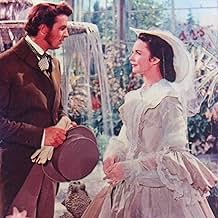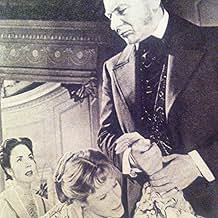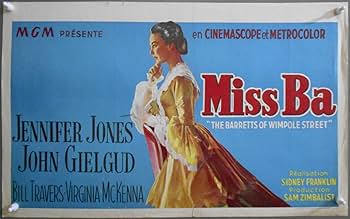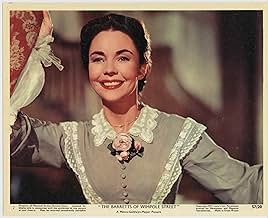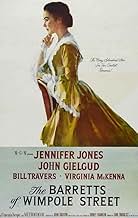Elizabeth Barrett's tyrannical father has forbidden any of his family to marry. Nevertheless, Elizabeth falls in love with the poet Robert Browning.Elizabeth Barrett's tyrannical father has forbidden any of his family to marry. Nevertheless, Elizabeth falls in love with the poet Robert Browning.Elizabeth Barrett's tyrannical father has forbidden any of his family to marry. Nevertheless, Elizabeth falls in love with the poet Robert Browning.
Christopher Cooke
- Minor Role
- (uncredited)
- Director
- Writers
- All cast & crew
- Production, box office & more at IMDbPro
Featured reviews
1957's 'The Barretts of Wimpole Street' is not the first version of Rudolf Beiser's stage play or the real life romance of Elizabeth Barrett and Robert Browning. There is also the 1934 film, seen two years ago, with Fredric March, Norma Shearer and Charles Laughton and aslso directed by Sidney Franklin, which is on the whole a great film especially the performances of Shearer and Laughton (March and the overlength being the weak links). Despite being nervous about it being an extremely close remake, it was still seen anyway because of the story and for the wonderful Sir John Gielgud.
Actually found this a well worth watching and worthy remake, or more other version, and it fares better than quite a lot of them. The reason why there was apprehension about this is due to having seen some very close, word for word, shot for shot remakes that are abysmally executed, a very strong example being 1998's 'Psycho', and was really hoping that it would not be on that level. Thankfully it's not and it didn't feel completely pointless, as there is enough for it to stand on its own and a lot works on its own merits. The earlier film is the superior film definitely in my view, but this version of 'The Barretts of Wimpole Street' shouldn't immediately be written off.
'The Barretts of Wimpole Street' isn't perfect. It does drag at times, the original did do as well but not as significantly, especially in the final act which feels over stretched and lacks tension.
Did feel too that it does focus a little too much on the romance, which isn't as intriguing or as atmospheric as the father and daughter relationship (which was always more interesting before) and it is here where some over faithfulness is apparent. That Bill Travers is on the bland side at times doesn't help.
However, there are a lot of things done right. It is very sumptuously and atmospherically made and doesn't feel too stagy. Jones looks absolutely beautiful in her costumes. Bronislau Kaper's score is haunting and lusciously scored without being too melodramatic. Franklin gives direction as polished, as sensitive and as distinguished as other works of his and throughout 'The Barretts of Wimpole Street' is written with great intelligence and dignity. It doesn't suffer from being too talky like other play-to-film adaptations did at the time and the story remains gripping and didn't feel draggy or creaky mostly.
Especially in the father and daughter relationship which effectively gives one the shivers and has some real intensity. Travers and Jones do have some nice subtle chemistry but it doesn't have the same impact as the chemistry between Jones and Gielgud. The supporting cast are solid and Jones gives a nuanced, deeply felt performance (didn't think her pallid at all), but the acting honours go to Gielgud at his most sinister as a monster of a character.
In summary, well worth watching and worthy. 7/10.
Actually found this a well worth watching and worthy remake, or more other version, and it fares better than quite a lot of them. The reason why there was apprehension about this is due to having seen some very close, word for word, shot for shot remakes that are abysmally executed, a very strong example being 1998's 'Psycho', and was really hoping that it would not be on that level. Thankfully it's not and it didn't feel completely pointless, as there is enough for it to stand on its own and a lot works on its own merits. The earlier film is the superior film definitely in my view, but this version of 'The Barretts of Wimpole Street' shouldn't immediately be written off.
'The Barretts of Wimpole Street' isn't perfect. It does drag at times, the original did do as well but not as significantly, especially in the final act which feels over stretched and lacks tension.
Did feel too that it does focus a little too much on the romance, which isn't as intriguing or as atmospheric as the father and daughter relationship (which was always more interesting before) and it is here where some over faithfulness is apparent. That Bill Travers is on the bland side at times doesn't help.
However, there are a lot of things done right. It is very sumptuously and atmospherically made and doesn't feel too stagy. Jones looks absolutely beautiful in her costumes. Bronislau Kaper's score is haunting and lusciously scored without being too melodramatic. Franklin gives direction as polished, as sensitive and as distinguished as other works of his and throughout 'The Barretts of Wimpole Street' is written with great intelligence and dignity. It doesn't suffer from being too talky like other play-to-film adaptations did at the time and the story remains gripping and didn't feel draggy or creaky mostly.
Especially in the father and daughter relationship which effectively gives one the shivers and has some real intensity. Travers and Jones do have some nice subtle chemistry but it doesn't have the same impact as the chemistry between Jones and Gielgud. The supporting cast are solid and Jones gives a nuanced, deeply felt performance (didn't think her pallid at all), but the acting honours go to Gielgud at his most sinister as a monster of a character.
In summary, well worth watching and worthy. 7/10.
Twenty years earlier the same director made the same film in black and white, and this is supposed to be an improvement. It is in technicolour, and it is hard to believe any version could be better. They should actually be quite equal, as both versions use the same script and the same music - only the actors are different. It is also hard to believe that any actress could be better than Jennifer Jones, a specialist in sensitive roles approaching a breaking point, and it is also hard to believe that Fredric March was more perfect in the role than Bill Travers, who couldn't have been more convincing. On the other hand, John Gielgud and Charles Laughton should really have been equals in the formidable role of Edward Barrett, a Dickensian tyrant of the highest degree, who must be the more pitied for his fatal lack of understanding and psychology, refusing to realise that by exerting total strict control of his children they must be stifled, as Elizabeth expressly says, "I am a dying woman", only because of her overbearing father, while Browning actually restores her to life and makes her live for the first time in her life. The actors are all outstanding, but the greatest credit is with the play, which was rightfully a tremendous success from the start, and both films just have to make the play triumph.
The Barretts are a wealthy London family headed by the commanding patriarch Edward Moulton-Barrett (John Gielgud). He has nine children and he demands to be their only object of affection. Elizabeth (Jennifer Jones) is a poet and often unable to walk. She is left stuck on her couch until fellow poet Robert Browning (Bill Travers) enters her life. Of course, father works against the relationship.
It is a costume drama from the 50's. It moves a little slow. I would consider modifying Elizabeth. A couple of things occur to me about her condition. Somebody has to help her dress and undress every day. Somebody has to take her to the bathroom. It doesn't have to be crude, but even alluding to all that would show how she is trapped inside her room and in herself. That does bring up her walking. Jennifer Jones is unable to project the needed frailty in her struggle to walk. She is using too much strength. Maybe she is projecting like she's in a play. On the other hand, John Gielgud has no trouble projecting any range he wants. He is doing a master class of acting. All in all, I like most of this.
It is a costume drama from the 50's. It moves a little slow. I would consider modifying Elizabeth. A couple of things occur to me about her condition. Somebody has to help her dress and undress every day. Somebody has to take her to the bathroom. It doesn't have to be crude, but even alluding to all that would show how she is trapped inside her room and in herself. That does bring up her walking. Jennifer Jones is unable to project the needed frailty in her struggle to walk. She is using too much strength. Maybe she is projecting like she's in a play. On the other hand, John Gielgud has no trouble projecting any range he wants. He is doing a master class of acting. All in all, I like most of this.
"The Barretts of Wimpole Street" (1957) is a word-for-word remake of the classic 1934 version by the same name. And, as such, I wonder why anyone should even bother seeing this film. After all, since the original version was a very nice and well-acted film (despite Charles Laughton overacting a bit), I can't see seeing a re-make--especially one that took almost no effort to make. Now I am not saying the 1957 film is bad--it is lovely to look at and the story is interesting. I just don't believe in rewarding studios for slap-dash remakes. In fact, unless the original film is seriously flawed and the remake corrects this, I can see no logical reason to see the remake and usually make it a habit to avoid them! So why did I watch the 1957 film? Well, I was flying cross-country and this film was one of the choices on the menu for in-flight films. And, in this sense, it fit the bill--and was pleasant but not particularly inspired.
Although not as engaging as the original play, This film adaptation of BARRETTS OF WIMPOLE ST is a very well made film. John Gielgud gives one of his finest screen performances as Edward Barrett, he is despicable yet worthy of pity. Jennifer Jones is strong as Elizabeth and her character unfolds beautifully before your eyes. The actors who play the clan of brothers nicely delineate each role so they are individuals and not a unit. this film does suffer a bit from the over emphasis on the elizabeth/browning relationship as opposed to the father/daughter one but I suppose this was the hollywood trend toward romance at the time.
Did you know
- TriviaBill Travers and Virginia McKenna got married in September 1957, after the January 1957 release of this film. Travers plays the role of poet Robert Browning, Elizabeth's love interest, and McKenna plays Henrietta, Elizabeth's younger sister.
- GoofsThe London pillar boxes weren't painted red (as seen) until 1874; before that, they were green.
- ConnectionsReferenced in Wogan: Episode #10.35 (1990)
- SoundtracksWilt Thou Have My Hand
Music by Herbert Stothart
[Elizabeth and all her siblings sing the song in her bedroom as she plays the piano; theme heard in the score throughout the movie]
Details
- Release date
- Countries of origin
- Language
- Also known as
- Lo que las paredes ocultan
- Filming locations
- Marylebone Church, Marylebone, London, England, UK(wedding sequence)
- Production company
- See more company credits at IMDbPro
- Runtime
- 1h 45m(105 min)
- Aspect ratio
- 2.55 : 1
Contribute to this page
Suggest an edit or add missing content




